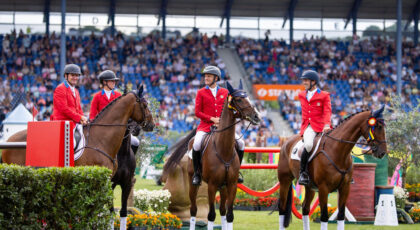I first met Rib Rab Reuben, a 14.3h Quarter Horse gelding, when he arrived at Days End Farm Horse Rescue (DEFHR) from Culpeper County, Virginia, as a neglect case in 2018.
He suffered from malnutrition, dermatitis, hoof neglect, and dental neglect.
A tough life
It was clear from the start that Reuben experienced far more than neglect in his previous life. He had scars on his face as well as around his belly, but it was his eyes that gave me a glimpse of his story.
After completing DEFHR’s rehabilitation program, Reuben started a training program with the plan of being evaluated under saddle. It was clear that Reuben had a negative association with people. He feared quick movements and any training tool that I happened to be holding.
As Reuben progressed in his training, he started to trust and make progress with daily tasks like haltering and picking up his feet for the farrier. Although he was growing in his training, we hit a point where riding Reuben just didn’t seem right to me. I felt confident that I could make that leap. I could push him that far, but was it fair?
I sensed Reuben communicating to me that he wasn’t comfortable moving forward with under saddle work, and at the age of 21, I understood that he deserved a comfortable life that didn’t involve being ridden. It was clear that Reuben had a rough career that caused trauma beyond what I could comprehend. Though it is never easy to make the decision to retire a horse, I thought this was the kindest gesture to offer my new friend.
However, does retirement from a riding career mean that he is destined to sit in a field for the rest of his life? Could I offer purpose to Reuben after retiring him from riding?
I continued working with Reuben on the ground, advancing his skills and discovering his new passions. I quickly found that Reuben loved working at liberty and connecting with his person. By allowing him to make his own choices, Reuben began to let go of what some would call “baggage.” Reuben was happy and confident working through obstacles at liberty, as well as maneuvers such as performing liberty circles and leading/backing.

Liberty to find purpose
When horses go through trauma such as abuse or neglect, the best way they know to protect and defend themselves is by shutting down. In my experience, liberty work has been a great tool to help horses like Reuben gain back confidence and start showing their personalities again.
With up-and-coming organizations like the International Liberty Horse Association (ILHA), horse owners have the opportunity to be part of a community and participate in competitions where riding is not necessary. Tests/patterns are offered at different levels, from lead line classes to liberty on a ridden horse. Bridleless classes are also offered.
I am excited to see how the development of organizations like the ILHA impact the horse industry and particularly horses that have survived situations similar to Reuben’s. I would love to see more “companion horses” finding purpose beyond their riding days.
Reuben’s pursuit of happiness
In 2019, Reuben was adopted out through DEFHR’s Guardian Program as a companion for an older horse with the understanding that he would be returned once his companion passed away. Through the Guardian Program, DEFHR retains the titles for horses throughout their lifetimes and requires annual facility and horse checks to track their health and well-being.
Reuben did return to DEFHR in September 2020 after the passing of his companion. I’m grateful for the opportunity to reconnect with an old friend and continue the work we began together in 2018, but my greatest wish is for him to find happiness in his forever home through the Guardian Program.
Reuben has always been a sensitive, yet kind gentleman. He has no reason to forgive, but Reuben’s heart is much greater than what my human heart can grasp. He has taught me far more than I have taught him, he teaches me about compassion, forgiveness, and what it means to be a true friend to those around you.
If you are interested in adopting this incredibly special horse, please reach out to DEFHR at adopt@defhr.org
About Days End Farm Horse Rescue’s Guardian Program
Horses in this program are either over age 20 or are younger horses that require special treatment and attention due to a medical condition. Similar to adoption, horses available through the Guardian Program are provided a forever home by compassionate caregivers. While caring for the Guardian Program horse, any expenses incurred by the caregiver are tax-deductible, including but not limited to feed, stall bedding, veterinary care, farrier care, medication, and supplements. In an effort to ensure each horse continues to receive the level of care they deserve, DEFHR retains the titles for Guardian Program horses throughout their lifetimes and requires annual facility and horse checks to track their health.


 February 12, 2021
February 12, 2021 

























